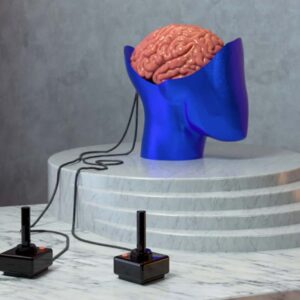
With the advent of new technologies, experts now say the definition of intelligence is changing. Smart people are not just individuals capable of solving complicated problems on their own, but also those who understand the way artificial intelligence, or AI, can best serve them. Simply put, understanding technology is essential.
Yet technology and artificial intelligence often scare people who get tangled in complicated explanations of what AI is and how it works. Two professors, Nick Polson from the University of Chicago Booth School of Business and James Scott from the University of Texas at Austin, tried to put a face on the technology by writing a book that illustrates the beginning of AI through several examples of historical figures and other individuals who developed algorithms for humanity’s different problems.
The book, “AIQ: How People and Machines Are Smarter Together,” lists mathematical methods for fighting enemies in World War II and keeping better track of health records in the Crimean War. Its mission is to make readers understand that AI is just another technology made by people who simply aimed for greater efficiency. Polson recently shared some of the book’s insights on AI and what challenges this technology faces with U.S. News. The interview has been edited for length and clarity.
What is AIQ?
People and machines working smarter together. The combination of AI and the combination of human IQ. This was the motivation for the name of the book, as well.
What is the challenge it brings?
To be better informed about AI is one of the great challenges of the next 20-30 years on all levels, from kindergarten to high school to universities, to anybody. Being much more informed about what AI is and how it’s done is one of the great challenges of mankind for the foreseeable future. And hopefully humans and machines working together in a smarter way is one of the positive ways forward.
AI is not new and in the beginning no one was really associating it with killer robots or job deprivation. What would qualify as the start of AI?
The beginning of AI would be the beginning of collecting and recording data. The fuel you need for AI is just pure data. In the book, we’ve got like seven stories of humans solving problems with AI. For instance, Florence Nightingale (a British reformer and the founder of modern nursing) in the Crimean War in the 1850s was one of the first people to collect health care records to try to make better medical decisions based on data. So in some sense, AI goes back to the beginning of data collection, (a) long time ago.
And why do we talk about it now?
Computers and machines have gotten so much faster, so this is a big revolution that’s taking place. Not only do we have enormous amounts of data from things like social media and other search mediums, but we also have much faster computers so you can now manipulate and look at data to find patterns and that type of thing. The reason why (AI) in 2018 has become more in the forefront is (because of) more data collection. But also, computers are better at looking and trying to find patterns in the data.
Should we fear robots will one day become self-aware and work against us, such as Elon Musk predicted?
I tend to think of it in a more positive way. What we should be currently doing is trying to inform ourselves better about it. There’s a lot of positive coming from it, too. We should inform ourselves about what it (AI) currently is and what machines are actually good at and how they do that. So less on the fears and more on the positive – humans and machines working smarter together.
(Also) one of the interesting things that Elon Musk has said, and I think Bill Gates has said the same, is that we need to think carefully about what types of regulations we need to put on AI. For example, maybe you are talking to a chatbot on the web and maybe there should be a little window that says you are actually talking to a computer, not to a human. The regulation issue of AI is again one of the big challenges, but in order to regulate things properly you first need to understand it.
What should the younger generation get ready for since more tasks will become automated?
I always try to persuade my children to get into data science or data analytics, any courses that you can take to improve these skills. Also, people enjoy studying these types of things, and it’s a skill that’s been growing in the past five to 10 years and it seems to be exploding. A lot of people want to do more analytics and data science and that’s another positive of this AI revolution, that people are now trying to understand these methods and applications.
From a researcher’s perspective, do you think automation will negatively impact our jobs?
Machines are already better than humans at a number of things, such as playing chess. There’s no way a human could beat a machine at that type of thing. And even at things such as image recognition – trying to figure out whether there’s a cat or a dog in a photo – the machines have gotten incredibly good at doing that, too. On the other side, there’s a lot of things that humans still do better than machines. For example, just picking up a cup and drinking from it is something that humans can do very efficiently (while) a machine faces way more difficulty. So I wouldn’t worry too much about it. There’s still plenty of things that machines are not good at.
What would the role of people be when machines work for us?
A thing that humans are very good at is (figuring) what’s the right question to ask, things like missing data. And if you don’t hard-code that into the data, the machine will have difficulties. So there are a lot of applications that humans can help a lot.
How is the world responding to AI?
The U.S. and China definitely seem to be leading, but everyone is trying: Samsung in South Korea, lots of companies in England. Every country is investing in AI – Germany, France, Australia. I gave a talk at the Imperial College London about deep learning, which is a specific machine-learning (process), and I think there were 350 people in the audience. For an academic, that’s a lot. So as a data scientist, I think everyone is trying to push the ball forward.











leo
June 23, 2018Nice post. I learn something totally new and challenging
on sites I stumbleupon everyday. It will always be exciting
to read through articles from other authors and practice something from
other websites.
pablo
June 23, 2018Simply a smiling visitor here to share the love (:, btw outstanding
layout.
kami
June 23, 2018Hi everyone, it’s my first go to see at this site, and article is truly fruitful in favor of me,
keep up posting these articles or reviews.
brigette
June 23, 2018Hello there, I found your blog by way of Google whilst searching for a similar topic, your website got here
up, it appears to be like great. I have bookmarked it in my google bookmarks.
hope
June 23, 2018I’m very glad to peer your post.
Thank you so much and i am taking a look ahead to contact you.
torpy
June 23, 2018Nice post
brod
June 23, 2018Just wish to say your article is as astonishing. The clearness in your post is just
cool and i can assume you’re an expert on this subject.
Well with your permission allow me to grab your RSS feed
to keep up to date with forthcoming post. Thanks a million and please carry on the rewarding work.
Anonymous
June 23, 2018You are my aspiration, I own few blogs and infrequently run out from brand :).
Anonymous
June 23, 2018Great delivery. Sound arguments. Keep up the good spirit.
Anonymous
June 23, 2018Good way of describing, and pleasant article to take facts regarding my
presentation topic, which i am going to convey in academy.
don
June 23, 2018I enjoy the efforts you have put in this, thanks for all the great blog posts.
ramon
June 25, 2018Howdy, i read your blog occasionally
Anonymous
June 25, 2018Hi I am so thrilled I found your weblog, I really found you
by error, while I was looking on Bing for something else, Nonetheless I am here now and
would just like to say kudos for a fantastic post and a all round interesting blog (I also love the theme/design), I don’t have time to browse it
all at the moment but I have book-marked it and also added in your RSS feeds,
so when I have time I will be back to read much more, Please do keep
up the excellent b.
sherrie
June 26, 2018I really like assembling utile info, this post has got me even more info!
catherine mckay
June 26, 2018I need to to thank you for this great read!! I absolutely enjoyed every little bit of
it. I have you saved as a favorite to look at new stuff
you post?
jefferson
June 27, 2018Great article.
timothy
June 27, 2018I am forever thought about this, thanks for posting.
morris
June 28, 2018Very good article. I definitely love this website. Thanks!
roderick
June 29, 2018What’s up, its nice article
roslyn
June 30, 2018I?m not that much of a internet reader to be honest but
your blogs really nice, keep it up! I’ll go ahead and bookmark your site
to come back later on. Many thanks
berndda
June 30, 2018Excellent way of explaining, and nice article to obtain information regarding my presentation subject matter, which i am
going to present in college.
chante
July 1, 2018At this time I am ready to do my breakfast, when having my breakfast coming yet again to
read more news.
ferdinand
July 1, 2018Hi to every one, since I am genuinely eager of reading
this website’s post to be updated daily. It consists of good stuff.
mallor
July 22, 2018This is very interesting, You are a very skilled blogger.
I’ve joined your feed and look forward to seeking more of your
wonderful post. Also, I’ve shared your website in my social
networks!
eroa
July 25, 2018I am curious to find out what blog platform you happen to be using?